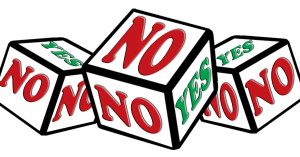My favorite dramatization of the power of saying yes is Jim Carrey’s character in “Yes Man.” Swayed from his seemingly sweeping ability to only say “no,” Carrey says yes to everything: From taking flying lessons to learning Korean to buying plane tickets on the first plane leaving the airport.

But, what about real life? What happens when the flight lessons are scheduled for the same time as the Korean language instruction?
That has been my experience as of late. My inability to say no, coupled with the desire to grow my business has led me to take on multiple projects from a variety of clients, all with the same (or similar) deadline.
Don’t get me wrong, I love the adrenaline rush of a fast-paced work environment, but I also love sleep and spending time with my family. With each new “yes,” I find myself setting the alarm clock earlier and earlier and working later and later, only to do the same thing the next day.
As entrepreneurs and business owners, the knee jerk reaction is to say, “Yes, of course I can help …” with everything. The problem is, when we overcommit, we spread ourselves too thin, cause unnecessary stress, and, in some cases, resentment for saying yes in the first place.
So, what does it mean to say “no”?
Turning down a project or task may mean that it does not align with your company’s goals or objectives. It may also mean you simply do not have time to help, or that you are not interested in working on it.
Sounds simple enough. Why then, is it so hard to say no?
According to an interview social psychologist Susan Newman gave to Fast Company, saying “no” is unnatural for most people.
“As young children, the word ‘no’ is drummed out of us,” Newman said in the article. “Most children seek their parents’ love and attention and come to realize that refusing what a parent asks or wants isn’t the way to get it. Toddlers, for example, who say ‘no’ often are reprimanded or punished. In some families, not doing what a parent requests leads to privileges being taken away.”
The fear of punishment or disappointment in not doing what someone asks feeds the desire to say “yes” to everything throughout life, according to Newman, who authored The Book of NO-250 Ways to Say-and Mean It and Stop People-Pleasing Forever.
Perhaps the best way to undo this learned behavior is through practice. The next time a project, task, request or social obligation comes along, instead of blindly saying “yes” and penciling it into your calendar, ask questions to determine if it aligns with what you already have planned.
If timing is the obstacle, see if it or other priorities could be shifted to make it work. If it’s not a good fit, empower yourself to say “no” and move on.
I know that saying “no” is easier said than done. Please share your approach to evaluating and ultimately saying “yes” or “no.”


